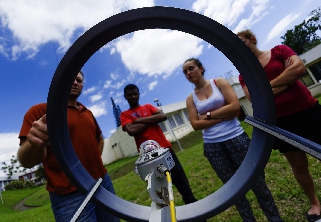Sustainable construction and energy


Areas of activity
• Sustainable construction
• Renewable energy
• Engineering and technical studies
• Contracting authorities and private project sponsors
Objectives
Sustainable construction and energy is a multi-disciplinary scientific and technical program for engineers wishing to work in the construction and energy sectors in tropical areas. It provides engineers with high-level qualifications in project engineering in tropical climate as well as the essential knowledge and skills to:
• design low-energy sustainable buildings
• develop efficient energy solutions, including renewable energy
• acquire a comprehensive vision of present-day environmental, social and economic issues
• reduce the impact of construction on the environment, especially in terms of greenhouse gases
The objective is to train engineers to encompass ecodesign principles in tropical areas such as Reunion Island, then to export this know-how to other Indian Ocean countries and across the world. The challenge we face in the 21st century is how to reduce fourfold our greenhouse gas emissions. As 30% of the world’s population live in the tropical areas, energy is a vital issue. ESIROI’s Sustainable Construction and Energy Master’s course will guarantee our graduates added value, both at a national and international level.
Skills
• Technical and scientific engineering
• Designing sustainable and innovative buildings in tropical environments
• Designing positive energy buildings in tropical environments
• Housing stock management and maintenance, energy control
• Project coordination and management
Career opportunities
• Design and consulting engineer
• Sustainable development management engineer
• R&D engineer specialised in energy control and renewable energy
• Community or company-based sustainable development executive
• Energy manager
• Site manager finishings and fittings (air conditioning, renewable energy)
• Supervising engineer
• Assistant Engineer to contracting authorities/project sponsor for HEQ buildings
International cooperation
• International: School of Architecture, Victoria University, Wellington (New Zealand), Laval University, Polytechnique Montréal and Ecole de Technologie Supérieure Montréal (Canada), University of Wollongong (Australia), Appalachian State University (The USA), Dalarna University (Sweden).
